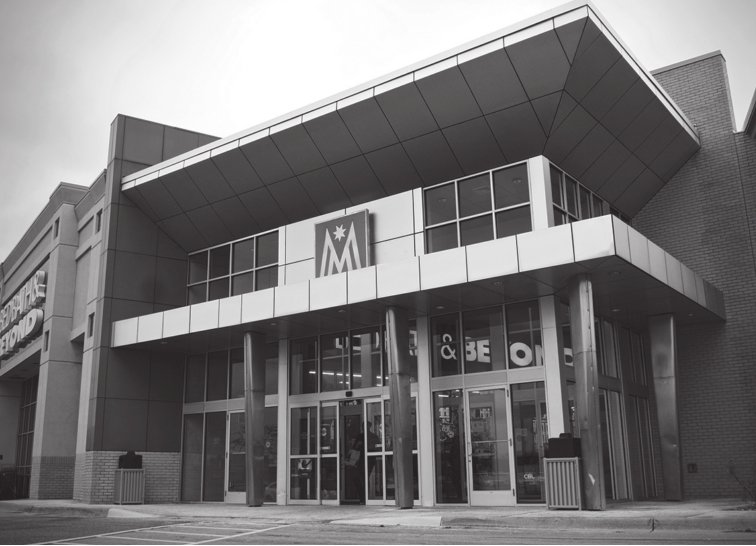
As digital retail swallows 9 percent of all sales and traditional national retail stores close down locations nationwide, American malls are faced with a dilemma: adapt or die.
The future of CBL Properties’ Meridian Mall could see it no longer relying on housing anchor stores, many of which are downsizing. J.C. Penney, RadioShack, Macy’s and Sears have all announced closures. Macy’s shut down its Lansing Mall locatio but retained its spot at Meridian Mall.
“Having two malls in a market the size of Lansing — one on the east, one on the west, puts some of these retailers from the national perspective into distress,” said Chris Buck, Meridian Township’s economic development director. “Their first line of defense is to minimize the number of competing stores in a region.”
Given Meridian Township’s much higher median household income of $65,000 compared to Lansing at $35,000 and Delta Township at $58,000, according to Census.gov, the Meridian Mall has a distinct advantage over the Lansing Mall in appealing to major retailers. Also competing with Meridian Mall is the Eastwood Towne Center, Lansing Charter Township’s outdoor shopping center. Lansing Charter Township reports a median household income of $42,000 according to Census.gov.
Meridian Mall’s general manager, Todd Huhn attributed the market of Michigan State University students as another important factor when comparing Meridian Mall’s success with its competitors.
But the mall can’t rely on the current status quo forever.
The facts cannot be ignored: U.S. Census data shows that online shopping has captured 9 percent of all sales, and that number steadily increases each passing quarter.
This trend coincides with many retail giants either declaring bankruptcy or compensating for the changing market by eliminating traditional brick and mortar locations.
But this is not enough to declare the idea of the American mall dead, at least not according to those within the industry. Stacey Keating, CBL Properties’ public relations director, downplayed the impact online shopping has on malls, referring to its effect as “complementary.” Still, Keating said malls are finding new ways to adapt to the changing market nationwide.
“Malls around the country, including our mall here, have said that retail as we know it may not come back,” Buck said. “The mall of the future might end up having a mixed component of storefronts and experience opportunities.”
Malls are fighting back by focusing on what online retail cannot provide: real tactile experience. Experience opportunities engage consumers beyond sales, such as restaurants, arcades or movie theaters. The Lansing Mall adopted this strategy in light of its own recent retail woes, devoting a serious amount of space to Regal Cinemas and Tequila Cowboy.
Meridian Mall is running parallel with this strategy by investing its economic future in providing shoppers with more than just a lineup of storefronts. Like its neighbor, Meridian Mall brought in a movie theatre, Studio C!, and opened a gym with Planet Fitness.
Huhn said Meridian Mall’s other main competitor, Eastwood Towne Center, primarily engages its shoppers through a variety of restaurants. Other shopping centers might want to follow their lead: Government data from the United States Agriculture Department shows that almost half of the money millennials spent on food came from going out to eat.
Keating said the decline of malls as a social hub for younger consumers is having a lasting influence across the industry. “I think that’s why you see properties reinventing themselves to offer more than just retail,” said Keating.
The Meridian Mall brought in the Michigan Women’s Hall of Fame earlier this year, following Keating’s notion that interactivity must eventually become the main focus.
Malls are also turning their eyes to the office space market. The Fairlane Town Center in Dearborn opted to skip searching for a new big box retailer and instead rented an empty space to Ford. Now 1,800 Ford employees will conduct their daily office work out of the mall for the next 10 years, while the automotive company renovates an office building of its own.
In-house access to amenities such as food courts, shopping and gyms at no extra cost made the deal especially appealing, David Dubenksy, Ford Motor Co.’s marketing and sales controller, told the Detroit Free Press. It’s a strategy that economic officials like Buck have become privy to, as they plan for the future investments of their own malls.
“You could see housing centers. You’ve got all the parking in the world, you’ve got a Planet Fitness, you’ve got a food court, you’ve got restaurants,” said Buck. “If you get creative you can put a wide variety of uses into an existing footprint instead of building something new.”
Should Meridian Mall one day have to resort to adopting one of these techniques, Huhn wouldn’t consider that a sign of failure, but of success.
“That’s an evolution that’s going on out there right now, the mall industry continues to evolve,” said Huhn. “Our main goal is to try and stay ahead of that.”
Support City Pulse - Donate Today!
Comments
No comments on this item Please log in to comment by clicking here